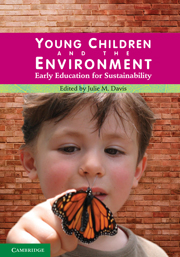Book contents
- Frontmatter
- Foreword
- Contents
- List of contributors
- Introduction
- PART 1
- Chapter 1 What is early childhood education for sustainability?
- Chapter 2 Children in the natural world
- Chapter 3 Leadership for creating cultures of sustainability
- Chapter 4 Practical possibilities and pedagogical approaches for early childhood education for sustainability
- Chapter 5 Ethics and pedagogy at the heart of early childhood education for sustainability
- PART 2
- Endnote
- Index
- References
Chapter 5 - Ethics and pedagogy at the heart of early childhood education for sustainability
from PART 1
- Frontmatter
- Foreword
- Contents
- List of contributors
- Introduction
- PART 1
- Chapter 1 What is early childhood education for sustainability?
- Chapter 2 Children in the natural world
- Chapter 3 Leadership for creating cultures of sustainability
- Chapter 4 Practical possibilities and pedagogical approaches for early childhood education for sustainability
- Chapter 5 Ethics and pedagogy at the heart of early childhood education for sustainability
- PART 2
- Endnote
- Index
- References
Summary
EDITOR'S NOTE
In this chapter our two New Zealand authors, Lesley Robinson and Sue Vaealiki, highlight ethics as a guide that provides tools for teaching and learning about environmental, educational, social and cultural issues and topics. They identify the ethics of caring, listening, participating and hopefulness as central to ECEfS and justify why this is so. They also propose a set of pedagogies that have resonance with ECEfS. These are interdisciplinary learning, co-constructing ‘working theories’ for living sustainably, building respectful relationships and participating in communities of action. It is the authors' belief that (re)considering the ethical and pedagogical foundations of early childhood education so that environmental and sustainability issues and topics are addressed, requires new professional journeys for early childhood teachers. These journeys offer challenges and great rewards for those who believe that children – in collaboration with their families and communities – can be rich and competent citizens of the present who already have capacities and capabilities to influence the future.
INTRODUCTION
The United Nations Decade of Education for Sustainable Development (DESD) (2005–2014) refocuses educational sectors on their role in ensuring that ‘people learn to live in sustainable ways’ (Parliamentary Commission for the Environment, 2004). The vision for this DESD is to create change at both personal and societal levels for a just and equitable world in which natural resources are protected for future generations.
- Type
- Chapter
- Information
- Young Children and the EnvironmentEarly Education for Sustainability, pp. 154 - 182Publisher: Cambridge University PressPrint publication year: 2010
References
- 5
- Cited by



